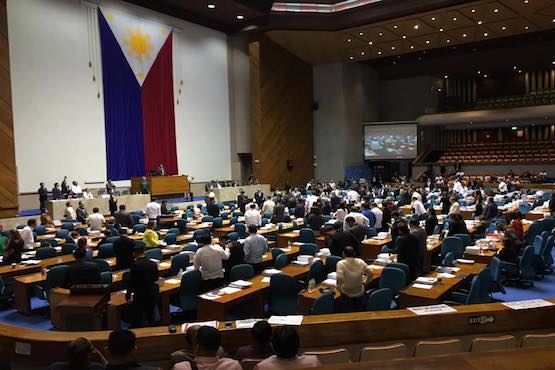The excessive politicization of Filipino human rights
October 9, 2017 · By Reuben James Barrete, Manila for www.ucanews.com
Recent move to slash commission’s annual budget underscores state apparatus attacks on rights advocates

The Philippine House of Representatives has agreed to restore the US$13.5 million annual budget of the Commission of Human Rights following an outcry when it moved to slash it to only US$20. (Photo supplied)
On Sept. 12, the Philippine’s House of Representatives gave the country’s Commission on Human Rights (CHR) a meager Php 1,000.00 or US$20 budget for the entire year of 2018.
The reason: lawmakers allied to President Rodrigo Duterte believe the commission “useless” because it does not investigate crimes committed by the drug addicts who are the targets of the government’s drug war.
The House was divided during the budget deliberations that led to 119 votes in favor of reducing the agency’s budget; while 32 lawmakers voted against. The Department of Budget and Management (DBM) had requested US$ 13.5 million for the commission.
Speaker Pantaleon Alvarez defended lawmakers, citing the commission for criticizing the conduct of the drug war.
The House on Sept. 20 promised to return the commission’s budget after an outcry and threats by senators to withhold approval of the US$731 billion national budget.
The development also followed a meeting with CHR Chairman Jose Luis Martin C. Gascon, who explained that the commission’s annual reports have also included non-state actors.
The lawmakers’ attack on the commission shows that many still do not understand the Philippine state’s commitments to uphold human rights, a commitment that goes back decades. It is a commitment that does not start or end with extra-judicial killings.
The Commission on Human Rights is an independent National Human Rights Institution created under the 1987 Philippine Constitution, established on May 5, 1987 by virtue of Executive Order No. 163.
The commission is mandated to conduct investigations on human rights violations against marginalized and vulnerable sectors of society, involving civil and political rights.
According to its mandate, it serves the sectors of women, children, youth, persons deprived of liberty, indigenous peoples, workers, internally displaced persons, people in poverty, people with disabilities, senior citizens, LGBT and other marginalized groups.
The commission was blasted by lawmakers who believe Duterte’s claim that the agency is being used as an avenue to protect criminals, particularly those killed in the war on drugs that has already claimed the lives of 13,000 adults and 57 children.
The blatant politicization of human rights under Duterte’s administration does not only reflect the stance of the government; it also contributes to the deterioration of the public’s treatment of human rights groups and institutions.
The manipulation of these rights by public servants and legislators polarize the importance of the coverage of rights to many aspects of public life.
The excessive politicization of these rights was manifest even during the earlier months of Duterte in power. He has launched tirades against international watchdogs, including the United Nations and the European Union.
Recently, Duterte called for police to shoot human rights activists “obstructing justice”.
On Aug. 16, he instructed the Philippine National Police (PNP) to “shoot those who are part of drug activities” and human rights advocates.
These statements from Duterte have resulted in an increasing and alarming number of deaths in the country. Despite many calls to stop the killings, no one has been held accountable.
The complicit environment of the Philippines toward these killings needs genuine political commitment and action, not just a statement of principles.
The Philippine government deliberately disregards this.
The attacks on human rights go beyond the drug war.
Last month, Duterte expressed his concern about the insurgency in the southern Philippines. He repeated military claims that the Lumad (indigenous groups in Mindanao) are suspected of being members and sympathizers of the New Peoples Army.
“Get out of there, I’m telling the Lumads now. I’ll have those bombed, including your structures,” the president said. “I will use the armed forces, the Philippine air force. I’ll really have those bombed … because you are operating illegally and you are teaching the children to rebel against the government,” he said.
Human Rights Groups were alarmed by Duterte’s statement, and urged him to retract it.
Human Rights Watch said international humanitarian law “prohibits attacks on schools and other civilian structures, unless they are being used for military purposes,” adding that deliberate attacks on civilians, including students and teachers, “is also a war crime.”
The continuous vindictive measures of the Duterte administration to curb institutional power and safeguards to protect human rights are all aimed at silencing critics.
The state apparatus channels tyrannical bureaucratic actions to justify the unremitting abandonment of human rights. The ridiculous budget moves simply reflect the president’s “kill” policy.
Reuben James Barrete is a development worker in Manila whose focus is human rights, poverty solutions, and social protection. He is taking up a Masters degree in International Studies at the University of the Philippines.






